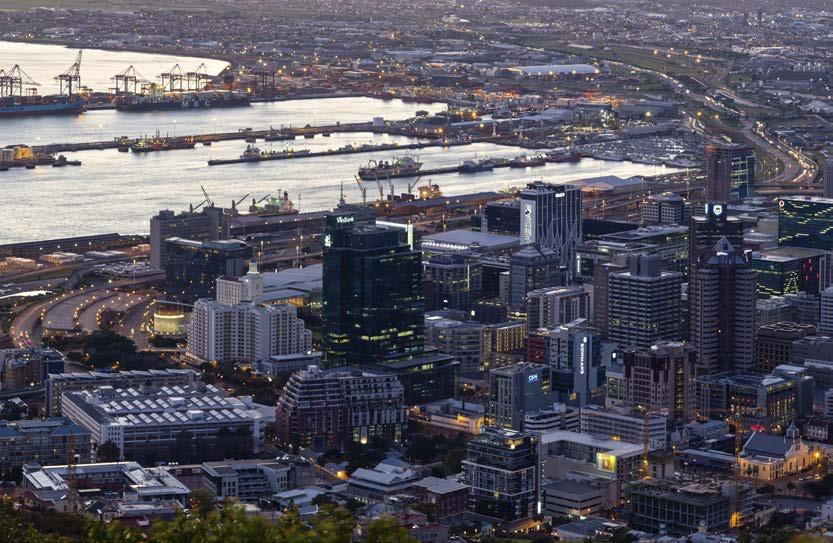
4 minute read
Office property sector facing rough patch
BY BONNY FOURIE bronwyn.fourie@inl.co.za
Experts say this is no time to be in hotels either, thanks to the effects of the pandemic, which means foreign visitors aren’t coming and locals can’t afford to stay in them
THE OFFICE property market continues to wallow in a pit of oversupply and rental income pressure – and not even the trend of officeto-residential conversions will be able to save it – not anytime soon, anyway.
The situation for hotels is even more depressing, says FNB commercial property economist John Loos.
The commercial property market, generally, was under pressure in terms of rising vacancy rates even before the coronavirus pandemic and lockdown but the past year has been the toughest for a long time, “for obvious reasons”.
Citing recently released MSCI data for last year, Loos says the overall vacancy rate for all commercial property was 8.7%, up from 7% in 2019 and 5.9% in 2017. While the rates for last year were 5.8% for retail and 5.9% for industrial property – which “typically have lower vacancy rates anyway” – the rise in office rates was most noticeable – 16.2%, from 12.7% the previous year.
“Office property does have a very high natural vacancy rate but there is no doubt that it is in a spot of bother.”
This sector is not helped by the fact that residential rental vacancy rates – which will have an impact on the possibility for conversions to assist office space demand – were even higher at 18%, a significant increase from 10.4% in 2019.
While Loos says there are occasional announcements of office-to-residential conversions in Sunninghill and Sandton in Joburg, and in Durban, he is not convinced that the trend is widespread or that it will absorb much of the oversupply. To do this, office properties would need to be converted into more affordable rental homes, which is often problematic due to the costs of such conversions.
“The big problem in places like Sandton, for instance, is that there is not only a high office vacancy rate but also a high residential vacancy rate... so, I don’t think there is room for more luxury, upmarket residential properties.
“This will then change the income demographics of areas like Sandton, Sunninghill and Rivonia, and these will be big changes. Even retail offerings will have to change significantly. So, I do not see it playing out any other way.
“If the residential vacancy rates were low, then fine, we could re-purpose like crazy, but not when there is an oversupply of residential property too.”
“Quite a few” conversions are taking place in Sandton, Randburg, Sunninghill, Rosebank and the Johannesburg CBD, says Zeenat Ghoor, chief executive and founder of Aspire Consulting, but such re-purposing is made “more challenging and less popular” by the building costs.
“The buildings need to be configured in a way that makes it possible to be converted to residential and the price of the building needs to be favourable. Considerations like parking, location and town planning schemes are also important.”
This means while a high percentage of unoccupied office buildings can be converted, the sales costs have to be measured.
“The next conversion (trend) could likely be office buildings to sectional title offices or mixeduse spaces, so there is not an oversupply of residential units,” she says.
The past two years have seen an “aggressive push” towards office conversion to co-working spaces. This is due to businesses downscaling and opting to have staff work from home.
Ghoor adds: “There has been a shift in thinking about working and it has become acceptable to have meetings online and work at home. While this has simplified travelling, reduced travelling costs and kept us safe, a large percentage of people prefer face-to-face meetings.
“Humans also need contact with others to thrive, grow and learn, so a co-working space provides the interaction space needed at a much reduced overhead costs.”
Gary Vos, franchisee of Rawson Cape Metropole Blaauwberg Commercial, says there are “twice as many” offices than the market needs.
“For that reason, some of these offices are staying vacant for longer periods, while others are being converted into residential apartments. Much larger offices are now being subdivided and used as communal offices (letting desk space only).”
The “real dog” of the property market though, Loos says, is hotels, the smaller and often-referred to as the fourth sector, of the commercial property market.
“This sector will be worst of them all, I think. Foreign tourists are not coming back in a hurry, domestic tourists are cash-strapped, so holidays have been put on the backburner, and a lot of business travel is not coming back. The ‘Zoom boom’ has been successful, so the hotel property market will be under serious pressure this year.”

The office property sector will remain under severe pressure this year, say experts.





